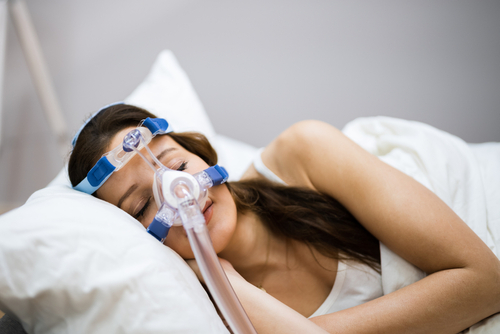Millions of people worldwide suffer from the common but potentially dangerous sleep disorder known as sleep apnea. Breathing problems during sleep, which cause sleep disruption and various health problems, are its defining feature.

What is Sleep Apnea?
Breathing repeatedly stops and starts during the night, which is a symptom of the sleep disorder known as sleep apnea. The three main types of sleep apnea are as follows:
1. Obstructive Sleep Apnea (OSA): This is the most widespread type of sleep apnea and happens when the muscles in the back of the throat relax too much, temporarily obstructing the airway.
2. Central Sleep Apnea: This less frequent type of sleep apnea results from a breakdown in brain signaling to the muscles that regulate breathing.
3. Complex Sleep Apnea Syndrome: This type, also called treatment-emergent central sleep apnea, combines both obstructive and central sleep apnea.
Causes of Sleep Apnea
- The onset of sleep apnea can be caused by a number of factors, such as:
- Being overweight: Being overweight raises the risk of breathing obstruction in the throat due to the accumulation of fatty tissues there.
- Neck Circumference: Those with thicker necks may also have narrower airways, increasing the risk of airway obstruction.
- A Narrowed Airway: Some individuals naturally have a narrower throat or airway, which makes them more prone to obstruction.
- Family History: Your risk may be higher if sleep apnea runs in your family.
- Aging: Sleep apnea affects older adults more frequently.
- Gender: Men are more likely than women to develop sleep apnea, though the risk for women also rises with obesity, and it can be particularly prevalent during pregnancy and after menopause.
Symptoms of Sleep Apnea
Although the symptoms of sleep apnea can vary, they frequently include:
1. Loud and persistent snoring is a common symptom of many sleep disorders, especially obstructive sleep apnea.
2. Breathing Pauses – When a partner or family member notices these breathing pauses, they can last a few seconds to several minutes.
3. Gasping or Choking – Those with sleep apnea might awaken gasping for air or choking.
4. Extreme Daytime Sleepiness – Sleep apnea frequently results in low-quality sleep, which makes people feel extremely exhausted and sleepy during the day.
5. Concentration Issues – Sleep disturbances can lead to issues with memory and concentration.
6. Morning Headaches – People with sleep apnea commonly complain of frequent morning headaches.
Treatment Options
Sleep apnea must be effectively treated to avoid severe complications and enhance general well-being. Treatment choices comprise:
1. Lifestyle Modifications: In mild cases, lifestyle modifications such as weight loss, consistent exercise, and refraining from alcohol and sedatives before bedtime may help reduce symptoms.
2. Continuous Positive Airway Pressure, or CPAP, is the most widely used treatment for mild to severe obstructive sleep apnea. A CPAP machine continuously pushes air pressure through a mask to keep the airway open while you sleep.
3. Oral Appliances: These tools, akin to mouthguards, are made to reposition the jaw and tongue to maintain an open airway.
4. Surgery: In severe cases, surgery may be required to remove extra tissue or address structural problems with the airway.
5. Positional therapy: Some people only have sleep apnea when they are in particular positions when they are asleep. They might benefit from using particular tools or methods to maintain a good sleeping position.
Finally, it should be noted that sleep apnea is a common sleep disorder with the potential to hurt one’s health and quality of life. It’s crucial to be aware of the symptoms, get a diagnosis, and get treatment if necessary. People with sleep apnea can get uninterrupted, restful sleep and lower their risk of developing related health issues like diabetes, heart disease, and stroke with the right interventions. Consult a medical professional for a thorough assessment and a personalized treatment plan if you believe you or a loved one may have sleep apnea.